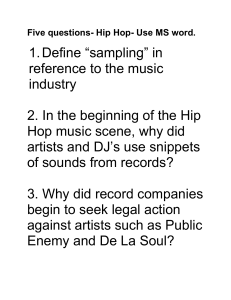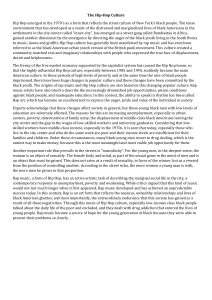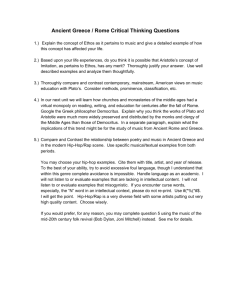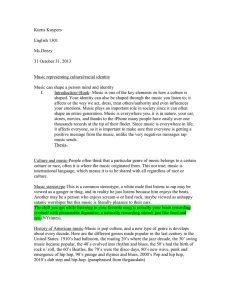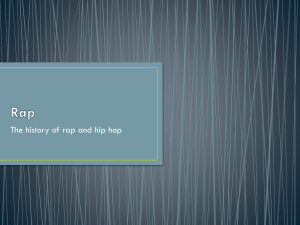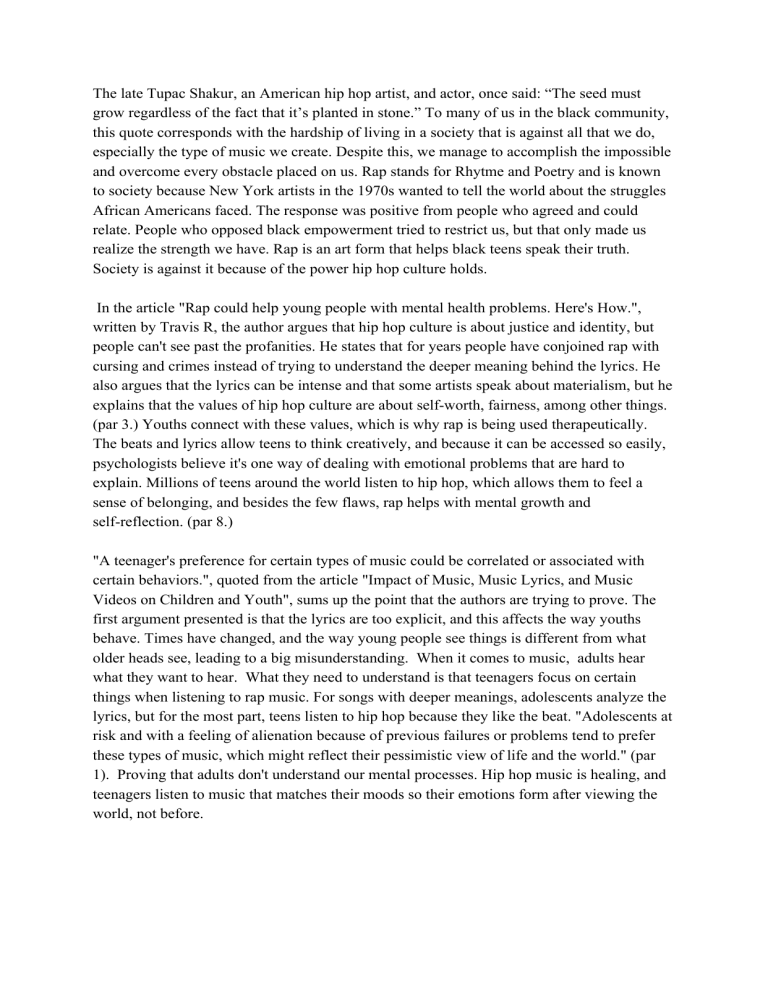
The late Tupac Shakur, an American hip hop artist, and actor, once said: “The seed must grow regardless of the fact that it’s planted in stone.” To many of us in the black community, this quote corresponds with the hardship of living in a society that is against all that we do, especially the type of music we create. Despite this, we manage to accomplish the impossible and overcome every obstacle placed on us. Rap stands for Rhytme and Poetry and is known to society because New York artists in the 1970s wanted to tell the world about the struggles African Americans faced. The response was positive from people who agreed and could relate. People who opposed black empowerment tried to restrict us, but that only made us realize the strength we have. Rap is an art form that helps black teens speak their truth. Society is against it because of the power hip hop culture holds. In the article "Rap could help young people with mental health problems. Here's How.", written by Travis R, the author argues that hip hop culture is about justice and identity, but people can't see past the profanities. He states that for years people have conjoined rap with cursing and crimes instead of trying to understand the deeper meaning behind the lyrics. He also argues that the lyrics can be intense and that some artists speak about materialism, but he explains that the values of hip hop culture are about self-worth, fairness, among other things. (par 3.) Youths connect with these values, which is why rap is being used therapeutically. The beats and lyrics allow teens to think creatively, and because it can be accessed so easily, psychologists believe it's one way of dealing with emotional problems that are hard to explain. Millions of teens around the world listen to hip hop, which allows them to feel a sense of belonging, and besides the few flaws, rap helps with mental growth and self-reflection. (par 8.) "A teenager's preference for certain types of music could be correlated or associated with certain behaviors.", quoted from the article "Impact of Music, Music Lyrics, and Music Videos on Children and Youth", sums up the point that the authors are trying to prove. The first argument presented is that the lyrics are too explicit, and this affects the way youths behave. Times have changed, and the way young people see things is different from what older heads see, leading to a big misunderstanding. When it comes to music, adults hear what they want to hear. What they need to understand is that teenagers focus on certain things when listening to rap music. For songs with deeper meanings, adolescents analyze the lyrics, but for the most part, teens listen to hip hop because they like the beat. "Adolescents at risk and with a feeling of alienation because of previous failures or problems tend to prefer these types of music, which might reflect their pessimistic view of life and the world." (par 1). Proving that adults don't understand our mental processes. Hip hop music is healing, and teenagers listen to music that matches their moods so their emotions form after viewing the world, not before. "Rap has a coded language and musical beats and sounds that keep outsiders outside."(Chaparian, par 1.) People who choose not to understand the benefits of rap music will never see the beauty in its art. Some might say that hip hop music is hated because it started as black music, and there's truth to this because it was created as a cry against racism and inequalities. Once society realized the power that this newfound voice carried, people tried to shut it down, but they failed because now teenagers can connect on levels that others can't understand. Tupac Shakur, The Notorious B.I.G, Dr. Dre along with other influential hip hop artists, are currently being praised for the doors they've opened for hip hop culture, but the hate they received before is indescribable. The overall conflict regarding hip hop is that people aren't openminded, which is why teenagers and adults disagree on the impact it has. For decades, black people have been targetted and criticized simply because of something we have no control over. There are a lot of possible outcomes with rap, but people refuse to see the benefits it has on teenagers and society in general. Many hip hop artists inspire adolescence to live and speak their truth, but certain people in civilization look at the negatives and lose sight of the overall impact. "They want a barcode on my wrist. To auction off the kids that don't fit their description of a utopia (black)." (Saba, 2018) The question our general population needs to sit and answer is why does rap music receive so much hate. Is it because of the lyrics or the people writing them? Reference A quote from The Rose That Grew from Concrete. (n.d.). Retrieved from https://www.goodreads.com/quotes/450131-the-seed-must-grow-regardless-of-the-fact -that-it-s. Council on Communications. (2009, November 1). Impact of Music, Music Lyrics, and Music Videos on Children and Youth. Retrieved from https://pediatrics.aappublications.org/content/124/5/1488. (2018, April 5). Retrieved from https://www.youtube.com/watch?v=A6F2OrOjexs Jr., R. T., Crooke, A., Texas State University, & University of Melbourne. (n.d.). Rap could help young people with mental health problems. Here's how. Retrieved from https://www.weforum.org/agenda/2017/08/the-healing-power-of-hip-hop. Rap Music: Its Images And Youth. (2014, March 5). Retrieved from http://cultureandyouth.org/rap-music/articles-rap-music/rap-music-its-images-and-yout h/.
